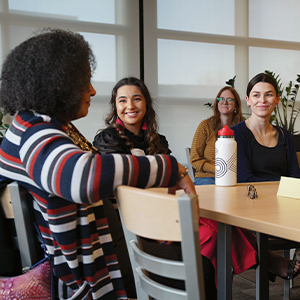Open Book participants share a joyful moment during a gathering at the Des Moines Art Center.
Writer: Brianne Sanchez
Photos: Macey Shofroth
Stories are shortcuts, introducing people and places we might not otherwise encounter. They help us discover meaningful connections, even amid isolating circumstances. Curious people often turn to books because novels and memoirs open up on demand, but everyone has a story to tell.
Here in Central Iowa, CultureALL’s Open Book program makes striking up a conversation with a stranger as simple as visiting the local library. Its catalog of personal narratives introduces real-life protagonists whose singular struggles touch broader topics like immigration, identity, grief, faith and more.

Since 2018, the social impact organization has recruited more than 50 Iowans from diverse backgrounds to serve as human “books.” They share short talks about a defining chapter of their lives with intimate audiences of “readers.”
From Charlie Brown’s harrowing story of surviving a traumatic childhood abduction to Sylvia Nemmers’ tale of defying society’s expectations as a blind woman to earn her Ph.D. in soil chemistry, human “books” prove why people shouldn’t be judged by their cover.
“Open Book can be a catalyst to speed up a relationship and introduce a conversation that maybe wouldn’t have naturally occurred,” said Karen Downing, a retired English teacher who brought the concept to CultureALL.
CultureALL supports human “books” through the storytelling process. It compensates them for visits to retirement communities, libraries, businesses and other locations.
Open Book’s story-sharing format was inspired by Human Library, a movement that began in Denmark in 2000 to address prejudice through personal connections.
CultureALL’s version is reciprocal. “We realized that, yes, people want to hear other stories,” Downing said. “They also really wanted to share their own and get a sense of their lived experience in conversation with someone else.”
She and former CultureALL AmeriCorps Service member JJ Kapur collaborated to localize the Human Library concept and measure its empathy-building impact.
Humanizing complex issues
Initiatives like “UpLift: The Central Iowa Basic Income Pilot” have participated in Open Book to bring local voices to issues like poverty and homelessness. Congregations have also used the program to build relationships across racial divides. Funding from Humanities Iowa helps the program connect urban and rural populations, too.
“A personal story can change a lens on an issue or big, thorny topic that people maybe don’t have a nuanced understanding of,” Downing said.
The vulnerability Open Book encourages can be validating for participants like Yerliana Reyna, an immigrant from the Dominican Republic who moved to Iowa by way of the Bronx, New York. Now a guidance counselor at Urbandale Middle School, she connected with Open Book after participating in the Iowa Latinx Project’s Media Ambassador Program. She shared her story at a senior center in Pella, a community known for its deeply Dutch heritage.
“I remember one of the ladies kept looking at me and then when I was done, she said, ‘You know that you are more brave than you think,’” Reyna said. “Your story can be of encouragement for somebody else.”
This story was first published earlier this year by Arts Midwest, a nonprofit that supports arts and culture in nine states and the Native nations that share the region.












Show Comments (0)